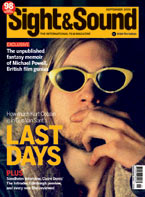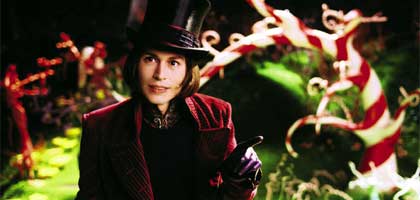Primary navigation

UK/USA/Australia 2005

Reviewed by Ryan Gilbey
Our synopses give away the plot in full, including surprise twists.
England, an alternative version of the present. Charlie Bucket lives with his poverty-stricken family in their cottage. At the top of the street looms the confectionery factory owned by the eccentric recluse Willy Wonka. Unseen since his recipes were plagiarised 15 years previously, Wonka has secreted golden tickets in five chocolate bars; those children who find them will enjoy a tour of the factory, with the grand winner receiving a prize beyond imagination. Charlie finds a ticket; the others go to the obese Augustus Gloop, the spoilt Veruca Salt, the gum-chewing Violet Beauregarde and the television-obsessed Mike Teavee.
During the tour, a terrible fate befalls each child except Charlie: Augustus falls into the factory's chocolate river and is sucked into the fudge room; Violet swells up after sampling untested chewing gum; Veruca is dragged down the rubbish chute by Wonka's nut-cracking squirrels after she tries to steal one of them; Mike is shrunk in a teleportation device. Charlie is awarded the grand prize - the factory - but rejects it when he discovers taking it would entail having to leave his family. With Charlie, Wonka visits his own estranged father, realises the importance of family and modifies his offer: Charlie can remain with his family in their cottage, now rebuilt inside the factory.
When Willy Wonka encourages the children who have won a tour of his fabled sweet factory to "try some of my grass", it is hard not to fear the worst. But there is a less druggy bent to this adaptation of Roald Dahl's novel than might have been expected from Tim Burton. The director plays it straighter than the 1971 film version, which resembled a bad trip. He chooses not to linger on some of the weirder details: his camera glosses over a burns ward for singed puppets and a ceremony in which the Oompa Loompas worship a giant cocoa bean, making these spectacles all the more intriguing.
But, disappointingly, the factory scenes are dulled by the familiarity of Alex McDowell's production design. The lack of surprises may partly be the fault of Burton, whose style - a hyper-glossy pop-art effect with gothic and surrealistic undertones - has been so pervasive. It was certainly discernible in the 2003 movie The Cat in the Hat, which repackaged the candy-coated suburban tableaux of early Burton for a pre-school audience. (Also designed by McDowell, that film was directed by Burton's erstwhile production designer, Bo Welch.) Consequently, even the youngest viewers will come to Charlie and the Chocolate Factory with their eyes primed. Perhaps Burton and McDowell should have worked harder to distinguish their film's most important sets from something that might crop up routinely on a cartoon series like Kim Possible or Dexter's Laboratory.
The movie is generally on firmer ground outside the factory gates, though even here there is confusion. We appear to be in a Gilliamesque retro-futuristic England where Americanisation has reached the currency (dollars) and language ('trousers' are 'pants'). But the non-factory sets do allow the film to take flight. With its parallelogram windows and fun-house floors, the lopsided cottage that is home to Charlie might have been recently vacated by Dr Caligari. And the image of Charlie in bed, staring at the night sky through a jagged hole in the roof, is so seductive that even practical afterthoughts (what happens when it rains?) cannot deflate its whimsicality. The flashbacks to Wonka's own childhood impressively evoke quiet misery - an important ingredient that tempers the shrillness in the rest of the picture. The tall, pinched town house where the factory owner spent his youth has a visual equivalent in the young Wonka: his face is winched into a permanent smile by an elaborate brace constructed by his dentist father.
It is in the flashbacks that Burton forcefully imposes his personality, not only because these scenes didn't originate with Dahl, but also because they revisit the parental tensions present in Batman (1989), Edward Scissorhands (1990) and Big Fish (2003). The flashbacks produce the richest moments in the film, underpinning Johnny Depp's interpretation of the adult Wonka as a child every bit as damaged as the wee terrors who have won a day in his company. His portrayal helps dispel one of the lingering discrepancies of Dahl's book and the earlier film version. It always seemed unfair that Wonka should be scornful of the greediness of children when he encourages this trait by staging a cynical marketing campaign to bombard them with his fattening products. But as Depp plays him, he doesn't look like he could tell up from down, let alone recognise contradictions in his own behaviour.
Depp's Wonka is both flamboyant and reserved, with eerily translucent skin and a shiny bob. He doesn't go daringly against the grain of the movie, as he did in Pirates of the Caribbean (2003). But then he doesn't need to: he's not competing for our attention, as no one else here has anything substantial to play. Depp understands that the rigor mortis grin that is a hangover from Wonka's childhood means that his choicest acting must be restricted to his eyes. Accordingly, he can be plaintive simply by dropping his gaze to the floor, or hilarious by registering silent panic as he is offered a bowl of crushed caterpillars.
If anything cramps Depp, and the film's sense of fun, it is the weight that is placed on reconciliation between Wonka and his father. Studio executives are notorious for prizing the kind of all-purpose embrace that heralds closure at the end of Charlie and the Chocolate Factory. But a director responsible, in Edward Scissorhands, for the complex image of a man unable to hold those he loves without scarring them should have known that the problems of his dysfunctional hero could not be solved in a single hug.